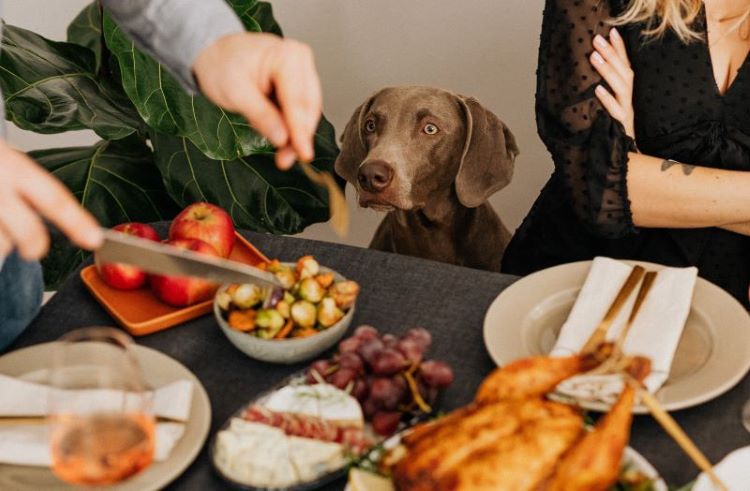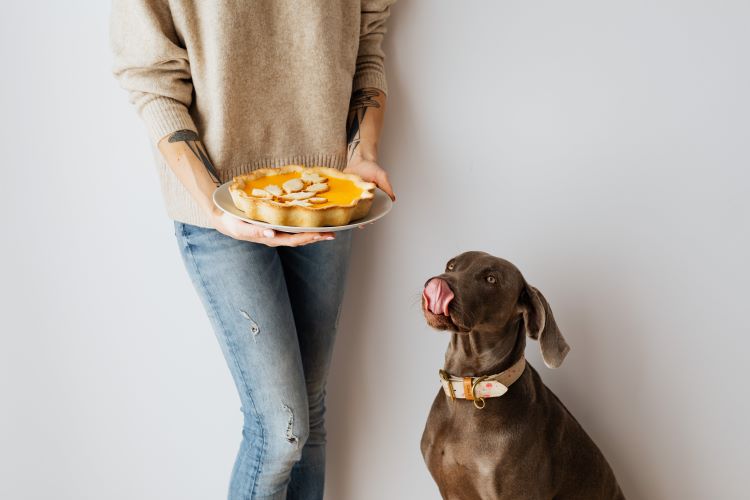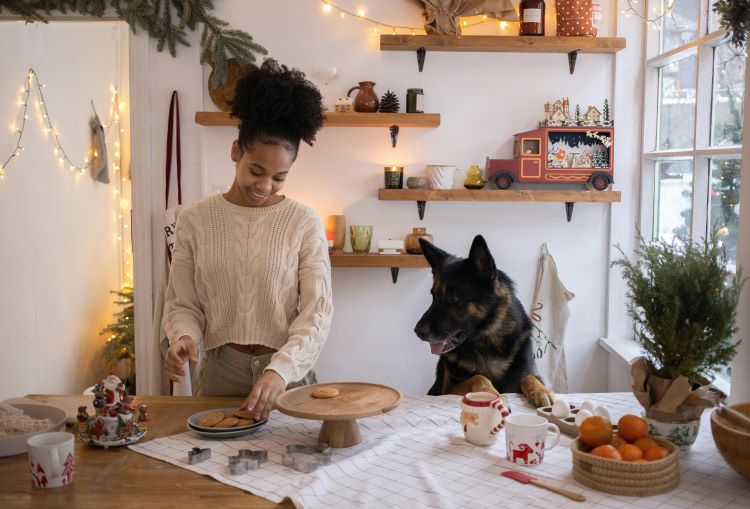Ready to help treat your pet to a healthy life?
Human Foods Dogs Can’t (and Can!) Eat During the Holidays in 2025
By : Brianna Gunter | Updated Oct 29, 2025

The 2025 holiday season is finally upon us! This is a time for family, and for many of us this includes our pets. But while we’re enjoying special treats like cookies and hot chocolate or a seasonal feast with turkey, potatoes, and all the fixings, can we share any of it with our dogs? Just what human foods can dogs eat around the holidays?
We know those big, round puppy eyes are hard to resist. Nevertheless, it’s crucial to get all the details before giving in and sharing special snacks with your pet. Many “people foods” won’t make your dog sick, but others can be surprisingly toxic — the last thing you want is a trip to the emergency animal hospital this season.
Always consult with your pal’s veterinarian before making any dietary changes (even if it’s “just this once!”) Likewise, it’s best to avoid doling out extra snacks to dogs that are struggling with being overweight or obese. Just like humans, an occasional snack here and there is fine, but too often can lead to negative effects. Dogs are also smaller than humans, and their portion sizes should reflect that.
In the meantime, read on for some general veterinary advice on what dogs can and can’t eat on Thanksgiving, Christmas, and other winter holidays.
The risks of giving human food to dogs
Many people instantly think of the dangerous health effects certain human foods can have on dogs. One of the most infamous examples is chocolate, which is known to contain toxic levels of theobromine and other dangerous chemicals. In high doses, this can cause serious health damage in your pet and may even result in death.
According to Trupanion veterinarian, Dr. Sarah Nold, two of the main risks of feeding human food to dogs — aside from toxicity with certain foods — include gastrointestinal (GI) upset and bad canine behavior. Even if your dog doesn’t get sick from eating “people food,” giving them food off of the dining table can encourage begging and other unwanted behaviors, which can be tough to shake once established.
Holiday foods that dogs can have
“I’m a believer, along with many veterinarians, that the best way to avoid GI upset and developing bad behaviors, such as begging, is for pets to only eat their own designated food away from the table,” Nold says. “However, I understand that many people want to give their pet something ‘special’ for the holidays. The pet industry also recognizes this, which is why there are so many seasonal toys and treats offered at pet stores and online. I saw pumpkin spice-flavored dog cookies just last week.”
With this in mind, Nold says the following food items can be okay for dogs to eat on occasion, in small amounts:
- Turkey – lean, light meat without seasoning or sauces
- Pumpkin – plain (no butter or seasoning) canned, or cooked pumpkin
- Potatoes – cooked, plain (mashed or cubed form without butter or seasoning)
- Yams – cooked, plain
- Rice – cooked, plain
- Green beans – plain canned, frozen, cooked, or fresh (trimmed)
- Corn – always removed from cob, plain canned, frozen, cooked, or fresh
- Marshmallows – plain and untoasted, never sugar-free (this can contain xylitol)
Note that any of the above items can be mixed with some of your pet’s usual dry or wet dog food. Nold also suggests mixing in a little chicken broth.
Toxic holiday foods for dogs
In addition to only serving your pet plain items off of the “safe” list in small quantities, there are some holiday human foods that you should avoid giving to dogs at all costs:
- Anything with garlic, chives, onions or scallions (this includes most stuffing)
- Raisins, currants, grapes
- Cranberry sauce
- Fatty or dark turkey meat
- Pie
- Gravy
- Chocolate
- Cookies and candy (any sugary human treats)
Call your veterinarian or nearest animal emergency clinic if you believe your pet has eaten anything dangerous. Don’t wait for them to start showing symptoms of being ill — swift treatment is key here.

Tips for keeping holiday treats safe for dogs
According to Nold, “Any new food has the potential to cause GI upset, including those specifically labeled for dogs.”
So, if you’re going to give your pal a special snack during the holidays, it’s always a good idea to check in with your veterinarian ahead of time. It’s also important to practice caution even if it’s something that’s widely considered safe for dogs.
“Allow any food you offer to your dog to cool sufficiently before offering to your pet,” Nold advises. “Consider testing the temperature first on the inside of your wrist.”
She also recommends feeding pets special treats in their food bowls rather than at the table or elsewhere, in order to help prevent unwanted behavior from developing. And it’s important to remember that some dogs may have health concerns or allergies that restrict what they can eat. What’s fine for one pup may not sit so well with another.
“Ideally you should contact your own veterinarian before feeding new food, especially if your pet has any chronic health concerns,” Nold says. “For example, a dog that has had a prior history of pancreatitis is at a higher risk of developing pancreatitis in the future and should only eat food that is low in fat.”
Store food properly
Whether or not you decide to give your pup some treats this season, take caution regarding holiday dishes and leftovers in general. Whether it’s Thanksgiving, Hanukkah, Christmas dinner or another busy time of food and family, it’s important to make sure that nothing is left unattended.
“Pets can be very sneaky, and you only have to be out of the room for a minute. The safest thing is to take trash with scraps outside to a secured place right away,” Nold says. “I have used my microwave and cooled oven as pet-proof storage for food items that aren’t going in the fridge… A pantry with a door is another potential safe place.”

Protect your pet throughout the holiday season
As we head through the 2025 holiday season and into the midst of winter, there’s no better time to think about dog safety and what steps you’re taking to protect your pal. And as fun as the holidays are, these months are full of pet dangers to be aware of.
While you’re taking stock of potential hazards, it’s also worth considering what the plan is if something unexpected does happen to your pet. It’s easy to budget for routine pet care costs, but there is no way to predict if and when unexpected illnesses and injuries will occur.
Taking the time now to sign your pet up for a quality pet insurance plan is a great way to ease the burden of surprise veterinary bills, not to mention prevent you from having to make difficult decisions. Learn more about pet health coverage today and how dog insurance can help.
